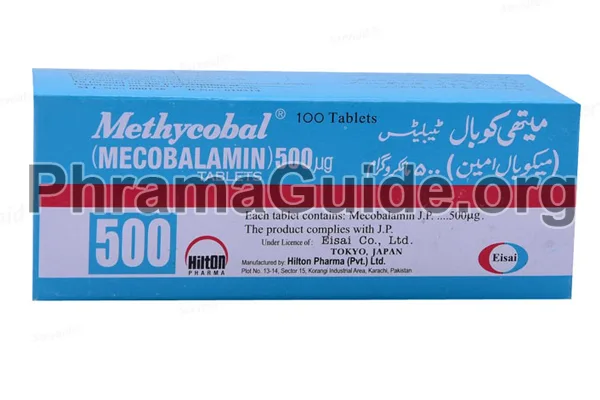Methycobal is a form of vitamin B12, which is essential for various bodily functions, including nerve function and the production of red blood cells. It is often prescribed as a supplement to treat or prevent vitamin B12 deficiency. Methycobal is generally considered safe when taken as directed, but like any medication, it can have side effects in some individuals.
Common Side Effects of Methycobal
The Side Effects reported with Methycobal are typically mild, these are:
- Skin Reactions: Some individuals may experience mild skin reactions, such as itching, rash, or hives.
- Nausea and Upset Stomach: Occasionally, Methycobal can cause mild gastrointestinal symptoms, such as nausea, vomiting, or diarrhea. These symptoms are usually temporary and resolve on their own.
- Headache: Headaches can occur in some people taking Methycobal, but they are usually not severe.
- Pain at the Injection Site: If Methycobal is administered by injection, there may be pain or discomfort at the injection site.
- Feeling of Swelling in the Body: In rare cases, some individuals may experience a sensation of swelling in the body, particularly in the extremities.

What is Methycobal?
Methycobal is one of the leading brands of Mecobalamin, manufactured and marketed by Hilton Pharmaceuticals, Pakistan.
Methycobal : Available Formulations and Strengths
Presently, Methycobal is available in Tablet and Injection forms
Methycobal Tablet : 500mcg strength
Methycobal Injection : 500mcg/ml strength
What Are The Possible Drug Interactions of Methycobal?
- Certain Medications for Anemia: Methycobal is sometimes used in the treatment of anemia, especially if the anemia is due to a vitamin B12 deficiency. It may interact with other medications commonly used to treat anemia, so it’s essential to coordinate treatment with your healthcare provider.
- Colchicine: Colchicine, a medication used to treat gout and other conditions, may interfere with the absorption of vitamin B12, including Methycobal. If you are taking colchicine long-term, your healthcare provider may monitor your vitamin B12 levels and recommend supplementation if necessary.
- Proton Pump Inhibitors (PPIs): Long-term use of proton pump inhibitors, such as omeprazole and esomeprazole, can reduce the absorption of vitamin B12. If you are on long-term PPI therapy, your healthcare provider may monitor your vitamin B12 levels and recommend supplementation if needed.
- Metformin: Metformin, a medication used to manage diabetes, has been associated with a decreased absorption of vitamin B12. If you are taking metformin, your healthcare provider may monitor your vitamin B12 levels and consider supplementation.
- Aminosalicylic Acid: Aminosalicylic acid medications used to treat certain gastrointestinal conditions, such as Crohn’s disease or ulcerative colitis, may reduce the absorption of vitamin B12. Your healthcare provider may recommend vitamin B12 supplementation if you are on these medications.
- Chloramphenicol: Chloramphenicol, an antibiotic, may interfere with the activity of Methycobal. This combination is generally avoided.
- Certain Anticonvulsants: Some anticonvulsant medications, like phenytoin and phenobarbital, may decrease vitamin B12 levels in the blood. Your healthcare provider may monitor your vitamin B12 levels if you are taking these drugs.
- Alcohol and Smoking: Excessive alcohol consumption and smoking can deplete vitamin B12 levels in the body. If you have these habits, your healthcare provider may consider vitamin B12 supplementation.

Leave A Comment